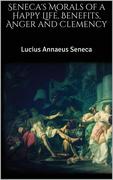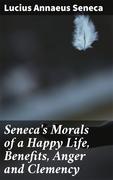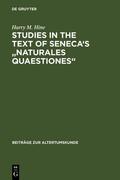70 Results for : seneca's
-

Between Heathenism and Christianity; Being a translation of Seneca's De Providentia and Plutarch's De sera numinis vindicta together with notes additional extracts from these writers and two essays on Graeco-Roman life in the first century after Christ
Between Heathenism and Christianity; Being a translation of Seneca's De Providentia and Plutarch's De sera numinis vindicta together with notes additional extracts from these writers and two essays on Graeco-Roman life in the first century after Christ ab 17.49 € als Taschenbuch: . Aus dem Bereich: Bücher, Taschenbücher, Geist & Wissen,- Shop: hugendubel
- Price: 17.49 EUR excl. shipping
-

Complete Works of Lucius Annaeus Seneca. Illustrated (eBook, ePUB)
As a writer, Seneca is known for his philosophical works, and for his plays, which are all tragedies. His prose works include a dozen essays and one hundred twenty-four letters dealing with moral issues. Seneca's influence on later generations is immense-during the Renaissance he was "a sage admired and venerated as an oracle of moral, even of Christian edification; a master of literary style and a model for dramatic art." Contents: THE TRAGEDIES THE MADNESS OF HERCULES THE TROJAN WOMEN THE PHOENICIAN WOMEN PHAEDRA THYESTES HERCULES ON OETA AGAMEMNON OEDIPUS MEDEA OCTAVIA THE EPISTLES TO MARCIA, ON CONSOLATION TO MY MOTHER HELVIA, ON CONSOLATION TO POLYBIUS, ON CONSOLATION THE MORAL EPISTLES THE ESSAYS ON ANGER ON THE SHORTNESS OF LIFE THE PUMPKINIFICATION OF THE DIVINE CLAUDIUS ON THE FIRMNESS OF THE WISE PERSON ON CLEMENCY ON THE HAPPY LIFE ON LEISURE NATURAL QUESTIONS ON BENEFITS ON TRANQUILLITY OF MIND ON PROVIDENCE- Shop: buecher
- Price: 0.99 EUR excl. shipping
-

Essays 6: Of Consolation to Marcia , Hörbuch, Digital, ungekürzt, 97min
Marcia actively mourned the death of her son Metilius for over three years. In Of Consolation to Marcia, Seneca attempts to convince her that the fate of her son, while tragic, should not have been a surprise. She knew many other mothers who had lost their sons; why should she expect her own son to survive her? The acknowledgement, even expectation, of the worst of all possible outcomes is a tenet of Seneca's Stoic philosophy. While Seneca sympathised with Marcia, he reminded her that "we are born into a world of things which are all destined to die", and that if she could accept that no one is guaranteed a just life (that is, one in which sons always outlive their mothers), she could finally end her mourning and live the rest of her life in peace.Translation by Aubrey Stewart and produced by Vox StoicaSeneca's Essays Series:Of providence - addressed to LuciliusOn the Firmness of the Wise Man - addressed to SerenusOf Anger (Books 1-3) - addressed to his brother NovatusOf Consolation - addressed to MarciaOf a Happy Life - addressed to GallioOf Leisure - addressed to SerenusOf Tranquillity of Mind - addressed to SerenusOn the Shortness of Life - addressed to Paulinus Consolation - addressed to PolybiusOf Consolation - addressed to Helvia ungekürzt. Language: English. Narrator: Robin Homer. Audio sample: https://samples.audible.de/bk/acx0/167843/bk_acx0_167843_sample.mp3. Digital audiobook in aax.- Shop: Audible
- Price: 9.95 EUR excl. shipping
-

Essays 1: Of Providence , Hörbuch, Digital, ungekürzt, 48min
The first book in the essays of Seneca deals with good and evil. The dialogue is opened by Lucilius complaining with his friend Seneca that adversities and misfortunes can happen to good men too. How can this fit with the goodness connected with the design of providence? Seneca answers according to the Stoic point of view. Nothing actually bad can happen to the good man (the wise man) because opposites don't mix. What looks like adversity is in fact a means by which the man exerts his virtues. As such, he can come out of the ordeal stronger than before. So, in perfect harmony with the Stoic philosophy, Seneca explains that the truly wise man can never surrender in the face of misfortunes but as he will always go through them and even if he should fall he will continue fighting on his knees. The wise man understands destiny and its design, and therefore he has nothing to fear from the future. Neither does he hope for anything, because he already has everything he needs - his good behavior. The conclusion is that actually nothing bad happens to good men. One just has to understand what bad means: bad for the wise man would be to have bad thoughts, to commit crimes, to desire money or fame. Whoever behaves wisely already has all the good possible. Translation by Aubrey Stewart and produced by Vox Stoica Seneca's Essays series: 1) Of Providence - addressed to Lucilius 2) On the Firmness of the Wise Man - addressed to Serenus 3, 4, 5) Of Anger (Books 1-3) - addressed to his brother Novatus 6) On Consolation - addressed to Marcia 7) Of a Happy Life - addressed to Gallio 8) Of Leisure - addressed to Serenus 9) On Tranquillity of Mind - addressed to Serenus 10) On the Shortness of Life - addressed to Paulinus 11) On Consolation - addressed to Polybius 12) On Consolation - addressed to Helvia ungekürzt. Language: English. Narrator: Robin Homer. Audio sample: https://samples.audible.de/bk/acx0/161477/bk_acx0_161477_sample.mp3. Digital audiobook in aax.- Shop: Audible
- Price: 9.95 EUR excl. shipping
-

Memorize the Stoics!
Memorize the Stoics! The Ancient Art of Memory Meets the Timeless Art of Living. The title says it all! Extolling the powers of God-given human reason, Stoic philosophers such as Roman knight Musonius Rufus and his student, the former slave, Epictetus, developed powerful practical lessons for living tranquil, virtuous, loving lives. These lessons were praised by such early Church Fathers as Justin Martyr and Origen. Epictetus's Handbook was later adapted as a moral guidebook for monks. A millennium later, Thomas Aquinas mined the Stoic Seneca's lessons on anger, gratitude, patience, and more for use in his Summa Theologiae. And in our own day, the psychological and moral teachings of the Stoics constitute an "art of living" that fairly cries out to act as compass for the nearly rudderless boat of our disordered contemporary world. But still, it is hard to live out important life lessons if you cannot remember them! In those same early centuries before and after Christ, Greeks like Simonides and Romans like Cicero championed a specialized "art of memory." Early Church Fathers such as Augustine and Jerome championed this also, as did, centuries later, Albert the Great and Thomas Aquinas. The unique virtue of Kevin Vost's book is its wedding of the ancient art of memory to the timeless art of living. In his Handbook, Epictetus exhorts us to "remember" his lessons a full dozen times, and in his own book Vost shows us how to do just this, thereby opening our eyes to unrecognized powers of imagination and memory, and to unrecognized capacities for controlling thoughts, emotions, and behaviors. Even so, the Stoics would not mind at all if you found this exercise of imagination and intellect a rather fun thing to do. Enjoy!- Shop: buecher
- Price: 24.99 EUR excl. shipping
-

Memorize the Stoics!
Memorize the Stoics! The Ancient Art of Memory Meets the Timeless Art of Living. The title says it all! Extolling the powers of God-given human reason, Stoic philosophers such as Roman knight Musonius Rufus and his student, the former slave, Epictetus, developed powerful practical lessons for living tranquil, virtuous, loving lives. These lessons were praised by such early Church Fathers as Justin Martyr and Origen. Epictetus's Handbook was later adapted as a moral guidebook for monks. A millennium later, Thomas Aquinas mined the Stoic Seneca's lessons on anger, gratitude, patience, and more for use in his Summa Theologiae. And in our own day, the psychological and moral teachings of the Stoics constitute an "art of living" that fairly cries out to act as compass for the nearly rudderless boat of our disordered contemporary world. But still, it is hard to live out important life lessons if you cannot remember them! In those same early centuries before and after Christ, Greeks like Simonides and Romans like Cicero championed a specialized "art of memory." Early Church Fathers such as Augustine and Jerome championed this also, as did, centuries later, Albert the Great and Thomas Aquinas. The unique virtue of Kevin Vost's book is its wedding of the ancient art of memory to the timeless art of living. In his Handbook, Epictetus exhorts us to "remember" his lessons a full dozen times, and in his own book Vost shows us how to do just this, thereby opening our eyes to unrecognized powers of imagination and memory, and to unrecognized capacities for controlling thoughts, emotions, and behaviors. Even so, the Stoics would not mind at all if you found this exercise of imagination and intellect a rather fun thing to do. Enjoy!- Shop: buecher
- Price: 33.99 EUR excl. shipping
-

Seneca's Morals of a Happy Life Benefits Anger and Clemency
Seneca's Morals of a Happy Life Benefits Anger and Clemency: ab 2.99 €- Shop: ebook.de
- Price: 2.99 EUR excl. shipping
-

Seneca's Morals of a Happy Life Benefits Anger and Clemency
Seneca's Morals of a Happy Life Benefits Anger and Clemency: ab 1.99 €- Shop: ebook.de
- Price: 1.99 EUR excl. shipping
-

Morals and Villas in Seneca's Letters
Morals and Villas in Seneca's Letters - Places to Dwell: ab 31.49 €- Shop: ebook.de
- Price: 31.49 EUR excl. shipping
-

Studies in the Text of Seneca's Naturales Quaestiones
Studies in the Text of Seneca's Naturales Quaestiones: ab 109.99 €- Shop: ebook.de
- Price: 109.99 EUR excl. shipping